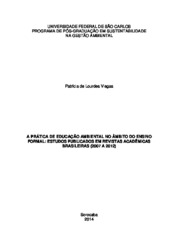A prática de Educação Ambiental no âmbito do ensino formal: estudos publicados em revistas acadêmicas brasileiras (2007 a 2012)
Abstract
Lately the production of research in the environmental area has been quite significant and presenting diverse to the point of preventing the knowledge of varied experiences, backgrounds and theoretical frameworks. In the context of Environmental Education in formal education many papers have been published in order to present their concepts, methodologies and results, however, there are not many publications that make an analysis of the work itself. Thus, through a descriptive-explanatory research with bibliographic procedures, the present study aimed to analyze the practices of environmental education developed along with the formal education, published in the period 2007-2012 through articles in academic journals that address exclusively Environmental Education, allowing to identify and present in a synthetic manner the production of knowledge in the subject concerned. Despite the executor profile, we chose not to classify this work as a study of state of the art, since besides providing information on study presents an analysis of the production thereof. Were instruments of studies: Environment & Education magazine, Brazilian Journal of Environmental Education and Research in Environmental Education magazine, all with an academic format and theme directed to Environmental Education. The data was processed from qualitative and quantitative analyzes. The method of content analysis was used based on categories for qualitative analyzes and descriptive statistics for quantitative analysis. According to the study, the practice of Environmental Education published a predominant feature profile applied to public institutions and elementary school in the Southeast region of the country. Its practices are that last for more than a year, developed by researchers, in which there is involvement of supporters. Primarily involve the range 1-50 participants and are developed at school. Involves various environmental themes and quantity and type of subjects not defined. There is a predominance of both the transverse and interdisciplinarity as an educational focus on content - critical analysis - action. The methodology is based on the method of teaching by projects, strategies and various techniques and evaluation process characterized with a mixture of techniques. As for the meanings predominated search for meanings of the environment by making use of various techniques. This study is a not only a basic assumption to evaluate how the environmental education has been developed in the academic and scientific context, but also as a guiding parameter for scholars who use this method to promote their studies and to those using the assumption as benchmarks for their work and for assessing the submission of articles. From this listing of practices in environmental education is still possible to identify gaps and impassable roads and thereby encourage the development of new studies directed to these, as well as make use of the aspects already established, recognizing and leveraging the value of research.
